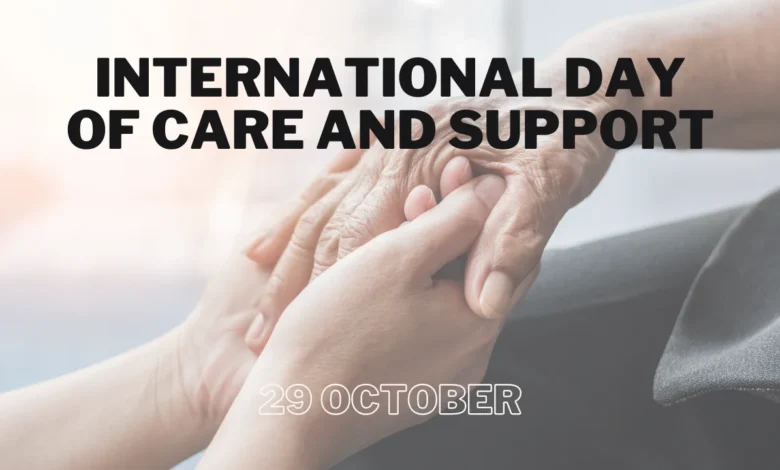“Care” The Foundation of Life, Families, and the Future of Every Child
International Day of Care and Support 2025

Every heartbeat of humanity begins and ends with care. From the first cry of a newborn to the gentle hands that guide aging parents, care sustains life, binds communities, and fuels progress. On October 29, 2025, the world comes together to mark the International Day of Care and Support, a day to honor the visible and invisible acts of care that make societies thrive.
Proclaimed by the United Nations General Assembly in 2023, and championed by global trade unions, civil society, and care advocates, this day reminds us that care is not a favor, nor a woman’s duty rather it is a public good, a shared responsibility, and a human right.
Care: The Invisible Work That Keeps the World Turning
Care is the unseen infrastructure of life. It is in the meals prepared before sunrise, the children walked to school, the sick tended to, and the homes kept safe and clean. Without care work whether paid or unpaid, no economy, institution, or community could function.
Yet, care remains undervalued and underfunded. Across the world, women perform more than three-quarters of unpaid care work, often at the cost of their own education, income, and well-being. If women’s unpaid care work were counted, it would amount to nearly 40% of GDP in some countries. This imbalance reveals a global truth: the foundation of our societies rests on the shoulders of those who care, mostly women without fair recognition or reward.
Care Begins at Home, and with the Child
The story of care begins in the home, and its first beneficiaries are children. Every child’s physical, emotional, and cognitive development depends on the quality of care they receive. The warmth of a caregiver, the consistency of affection, and the presence of supportive adults shape who they become, their confidence, empathy, and sense of belonging.
When caregivers are exhausted, unsupported, or economically stretched, the ripple effect touches children first. A society that fails to care for caregivers ultimately fails to protect its children. Conversely, when nations and communities invest in childcare, parental leave, health care, and early childhood education, children flourish and so do families.
From Invisible to Indispensable: Building a Caring Society
The 2025 commemoration invites us to reimagine care as the foundation of sustainable, equitable societies.
The recent ILO Resolution on Decent Work and the Care Economy (2024–2030) provides a clear global roadmap: to ensure that care work whether paid and unpaid, is recognized, respected, and properly resourced.
A truly caring society must:
- Recognize care as central to human well-being and gender equality.
- Reduce the burden of unpaid care through infrastructure, technology, and services.
- Redistribute responsibilities fairly among men and women, households, employers, and the state.
- Reward care workers with fair pay, dignity, and social protection.
- Represent caregivers in policymaking and decision-making.
- Resource care systems through sustainable public investment.
The Family: The First School of Care
Care is first learned, modeled, and multiplied within the family. It is in how parents listen, teachers nurture, and communities respond to need. A culture of care begins when we teach children empathy, responsibility, and respect through daily acts of kindness and shared responsibility.
In strengthening care, we strengthen families.
In strengthening families, we strengthen nations.
When children grow in environments where care is valued and supported, they become adults who carry compassion into leadership, workplaces, and communities. Thus, the care we give today is the legacy we pass on tomorrow.
Care Is Everyone’s Responsibility
On this International Day of Care and Support 2025, we are called to reaffirm one universal truth:
Care is the foundation of life, the heart of every family, and the future of every child. Let us honor the caregivers; mothers, fathers, teachers, health workers, domestic workers, and countless others, whose hands and hearts sustain our world. Let us commit to policies, partnerships, and practices that make care visible, valued, and shared. Because when we care for those who care, we nurture the soul of humanity itself.





